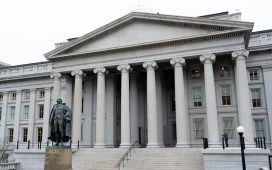Politicians have often struggled to explain how governments borrow money to fund their spending. The implications of higher or lower borrowing are also difficult to assess when the figures run into hundreds of billions of pounds.
The temptation is to simplify the arguments by comparing the nation’s finances to a household budget or a credit card. The shadow chancellor, Rachel Reeves, has talked about the Conservatives “maxing out the credit card”, and Keir Starmer and Rishi Sunak have also used the analogy.
But is it a fair comparison? A group of senior economists think not. They have complained to the BBC about one of its political journalists, Laura Kuenssberg, giving podcast listeners the wrong impression by using the household finance analogy when comparing day-to-day government spending with longer-term capital expenditure.
What provoked the row?
In a recent edition of the Newscast programme Kuenssberg, the broadcaster’s former political editor, suggested government borrowing was like a mortgage or taking out a credit card. She said: “One of the differences that is very important is the limit on borrowing for different kinds of spending. And just to give people some context, and I know some people object to trying to use metaphors to explain this stuff, I think actually it is quite important so you understand that borrowing for capital spending is a bit like if you took out a mortgage to buy a house or for day-to-day spending you buy loads of new frocks on your credit card: they are not the same kind of spending.”
Who else has made the household finances comparison?
Margaret Thatcher cited the family budget to defend limits on public spending during her three administrations in the 1980s. In 2008, the former leader of the Conservative party and now foreign secretary, David Cameron, said about Gordon Brown’s administration: “This government has maxed out our nation’s credit card – and they want to keep on spending by getting another.” Starmer said after the March budget that “the national credit card” was “maxed out”. Sunak and Reeves have also used the household analogy.
What’s wrong with the comparison?
Households have a limit on how much they can borrow because banks and other lenders put a cap on the amount. It means that once they have hit borrowing limits and can no longer afford to pay the interest bill, they tend to fall into arrears and before long creditors call in the debt. Thousands of households declare themselves bankrupt each year for this reason.
A review of the BBC’s economics coverage by Andrew Dilnot, a former head of the UK Statistics Authority, said in 2022 that countries also do not “tend to retire or die, or pay off their debts entirely” like households, which is why comparisons with household debt – and suggestions the government must ‘pay off’ or ‘pay down’ the debt – “can cause intense debate”.
How do governments borrow?
A government has an income, mainly from tax receipts, but unlike a household, it can raise many billions of pounds more in the short term by increasing taxes. If this is not desirable or possible, it can borrow from domestic lenders and international investors.
If that is not enough to cover the extra spending, there is another way it can generate income: it can print it. Unlike a UK household, the government has an independent central bank – the Bank of England – and its own currency. During the Covid-19 pandemic the Bank of England bought £450bn of bonds created by the government, in a process known as quantitative easing. These bonds funded about the same amount of spending by the government. The UK currently has a debt to GDP ratio – its total borrowings set against annual output – of 97%. However, it has been much higher, and hit 270% just after the second world war.
What do the economists and the BBC say?
Kuenssberg’s analogy is alleged to have breached guidance given to the broadcaster by Dilnot. The economists, among them Susan Newman, the head of economics at the Open University, said: “Andrew Dilnot was clear when he said language matters and that analogies between household debt and government debt are ‘dangerous territory, intensely contested, and can easily mislead’.”
The BBC said it was “committed to impartiality at all times”. “The thematic review into taxation, public spending, government borrowing and debt was a very important piece of work which provided invaluable insights, and we are committed to implementing its findings.”
This article was amended on 14 June 2024. An earlier version said that the Bank of England had created £450bn of bonds and invited investors to buy them; the government actually created the bonds, which were then bought by the Bank of England.
after newsletter promotion











